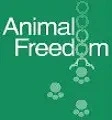People love animals. We keep cats, birds, fish, hamsters or even a pony as companions and care for them as best we can.
At the same time we eat animals unscrupulously.
Millions of chickens, cows, pigs and fish are captured and eaten on a daily basis.
In order to meet the demands of humans, animals are inseminated and bred artificially only to serve as food or material for clothing or cosmetics.
Countless animals are "produced" in this mechanical way: chickens in batteries, livestock in stalls and fish and crustaceans in breeding ponds.
Killing or slaughtering takes place in industries specially set up for that purpose, after which the dead "meat" is packed hygienically in neat dishes.
Although few people take time to think of the fate of animals, there has been a contra-movement over the past number of years.
At the instigation of groups such Gaia, Veeweyde and other animal protection organisations, laws and rules have been enforced by which mistreatment of animals is prohibited. Pictures of beaten dogs, emaciated horses, cows beaten within an inch of their lives and bludgeoned seals have become more and more abhorred.
Wide scaled killing of healthy animals following the outbreak of foot and mouth disease and fowl pest also raises questions about the ethical side of the matter.
Most reactions are just as emotional.
Animals may not be mistreated, but killing them for consumption would appear to be evident. It still appears that the concept " rights for animals" is an absurd idea.
More and more philosophers are becoming agitated about this topic.
In his book "Darwin, animal and rights", the Dutch philosopher Paul Cliteur seeks the ethical fundamentals of animal rights. The publication of "The Origin of Species" in 1859 by Charles Darwin upset the traditional human concept of "humans are the measure of all things". Human beings were not "created" in the year 4.004 b.C. - as theologians had calculated on the basis of the stories in the Bible - but were the product of an evolution over millions of years. Even so the Darwinists also continued to believe in human superiority which, amongst others, was expressed in the Universal Declaration of Human Rights. In this Declaration, rights are no longer "dictated by God" but arise from the specific nature of humans.
Since then, the concept of "human dignity" plays a central role. But, Cliteur wonders, why do humans have rights and animals do not? The argument that humans are capable of speech and animals are not, does not hold true, because horses and dogs for example are more communicative and skilled than newborn babies. The argument that humans can stand up for their rights and animals cannot, is also not totally correct, because mentally handicapped humans have rights in our opinion, and rightly so.
Cliteur explains that the non-recognition of animal rights arises from a variety of sources in our cultural inheritance: the classical, the Jewish-Christian and the Humanistic.
To date, we are referred to the distinction between humans and animals such as the capacity for memory, love, reason and above all awareness.
In 1789 Jeremy Bentham also stated that we should not just consider the difference but the communal capacity for suffering.
And Albert Schweitzer's "respect for life" forms the apex of his ethic. The latter cannot, however, be upheld when humans take it to the absolute, because in that case the aids virus and the plague bacilli would also have to be protected.
Cliteur quotes the ethicist James Rachels, who sees a distinction between 'having a life' and 'being alive' and Peter Singer who sees "personal" life as departure point. The fact that humans should protect a "rational and self aware creature" has huge implications. On the one side this makes abortion and euthanasia acceptable and vivisection, factory farming and experiments with animals unacceptable.
The American philosopher Tom Regan even translates this concept into rights for animals. "The animal rights movement is part of, not an antagonist of human rights", according to Regan.
Is a Universal Declaration for Animal Rights such a ridiculous thought? For Paul Cliteur, certainly not, although this would be greeted with sepsis by most people. That is logical, says the author, considering the general acceptance of the fac that animals are just instruments which may be used for consumption. However, there was once such acceptance of slavery, the inferior position of women and disapproval of homosexuality. Cliteur merely points out that change in such deep-seated concepts are difficult and take a long time, but are not impossible.
He wonders if we have moral blind spots. Insight into our moral failing in our approach to animals could become obvious in time just as the former attitude to slavery.
The plea for rights for animals is absurd and even scandalous to many people. They point to all the "human" suffering that still needs to be allayed. This is a reproach often heard by Gaia-Chairman Michel Vandenbosch. And still the one does not contradict the other. Protesting against animal suffering is actually no more than a consistent extension of moral repulsion of all unnecessary suffering. Whoever hears an animal groaning in pain knows that something similar occurs as in "human" suffering. The great difference is that animals cooped up in batteries, breeding boxes and stalls cannot protest in an organised way. Their suffering is none the less for this.
The consistent extension concept that we may accept no single form of unnecessary suffering in living creatures raises other questions, however, which are not dealt with in Cliteur's book, amongst others, the question about the value of possible animal rights. Or, put otherwise, how to act in a conflict between human rights and animal rights? May we sacrifice an animal in order to save a human? For the time being, says Cliteur, the answer is obvious: yes, of course.
A review by Critic: Dirk Verhofstadt. |

